Atresia - Study guides, Class notes & Summaries
Looking for the best study guides, study notes and summaries about Atresia? On this page you'll find 2288 study documents about Atresia.
Page 2 out of 2.288 results
Sort by
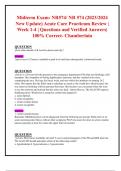
-
Midterm Exam: NR574/ NR 574 (2023/2024 New Update) Acute Care Practicum Review | Week 1-4 | Questions and Verified Answers| 100% Correct- Chamberlain
- Exam (elaborations) • 72 pages • 2023
-
Available in package deal
-
- $12.49
- 1x sold
- + learn more
Midterm Exam: NR574/ NR 574 (2023/2024 New Update) Acute Care Practicum Review | Week 1-4 | Questions and Verified Answers| 100% Correct- Chamberlain QUESTION How often should a CK level be drawn and why? Answer: least every 6-12 hours to establish a peak level and then subsequently a downward trend. QUESTION Sylvie is a 26-year-old who presents to the emergency department (ED) after just finishing a full marathon. She complains of feeling lightheaded, nauseous, and ha...
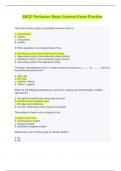
-
2024 ABCP Perfusion Basic Science Exam Practice - Q & A (Complete Solutions)
- Exam (elaborations) • 67 pages • 2024
-
- $27.99
- 1x sold
- + learn more
2024 ABCP Perfusion Basic Science Exam Practice - Q & A (Complete Solutions) The most common type of anomalous venous return is: a. supracardiac b. cardiac c. infracardiac d. cardiac A Pott's operation is an anastomosis of the: a. ascending aorta to the left pulmonary artery b. descending aorta to the pulmonary artery branch c. subclavian artery to the pulmonary artery branch d. ascending aorta to the subclavian artery The basic hemodynamic fault in a patent ductus arteriosus is a ____ -to- _...
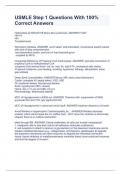
-
USMLE Step 1 Questions With 100% Correct Answers
- Exam (elaborations) • 29 pages • 2023
-
Available in package deal
-
- $10.99
- 1x sold
- + learn more
USMLE Step 1 Questions With 100% Correct Answers USMLE Step 1 Questions With 100% Correct Answers USMLE Step 1 Questions With 100% Correct Answers USMLE Step 1 Questions With 100% Correct Answers Heterophile ab NEGATIVE Mono-like syndromes -ANSWER *CMV HHV-6 HIV Toxoplasmosis Wernicke's Aphasia -ANSWER -word salad: well-articulated, nonsensical speech paired with lack of lang comprehension -aud association cortex: post part of sup temporal gyrus - supplied by MCA Congenital Deficie...
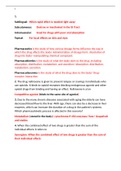
-
NURS 251 Pharmacology Final Exam-Portage Learning
- Exam (elaborations) • 17 pages • 2022
-
- $15.49
- 51x sold
- + learn more
NURS 251 Pharmacology Final Exam-Portage Learning 1 1. Sublingual: When rapid effect is needed right away Subcutaneous: Destroy or inactivated in the GI Tract Intramuscular: Used for drugs with poor oral absorption Topical: For local effects on skin and eyes Pharmaceutics is the study of how various dosage forms influence the way in which the drug affects the body/ Administration of dosage form, dissolution of drug into body/ manipulating chemical compound. Pharmacokinetics is the st...
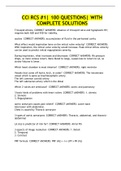
-
CCI RCS #1| 100 QUESTIONS| WITH COMPLETE SOLUTIONS
- Exam (elaborations) • 20 pages • 2023
-
Available in package deal
-
- $13.99
- 1x sold
- + learn more
Tricuspid Atresia CORRECT ANSWERS: Absence of tricuspid valve and hypoplastic RV; requires both ASD and VSD for viability. ascites CORRECT ANSWERS: accumulation of fluid in the peritoneal cavity What effect would inspiration have on the mitral valve velocity? CORRECT ANSWERS: With inspiration, the mitral valve velocity would increase. Peak mitral inflow velocity can be used to predict mitral regurgitation severity. During Inspiration, what increases and decreases CORRECT ANSWERS: RA...
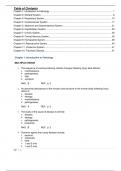
-
TEST BANK Radiographic Pathology for Technologists 6th Edition by Nina Kowalczyk
- Exam (elaborations) • 57 pages • 2024
-
- $15.49
- 1x sold
- + learn more
TEST BANK Radiographic Pathology for Technologists 6th Edition by Nina KowalczykTable of Contents Chapter 1: Introduction to Pathology .................................................................................................... 1 Chapter 2: Skeletal System .................................................................................................................. 6 Chapter 3: Respiratory System ...........................................................................................
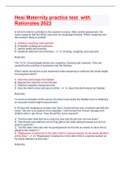
-
Hesi Maternity practice test with Rationales 2022/2023
- Exam (elaborations) • 10 pages • 2023
-
- $17.99
- 1x sold
- + learn more
A full term infant is admitted to the newborn nursery. After careful assessment, the nurse suspects that the infant may have an esophageal atresia. Which symptoms are this newborn likely to exhibit? A. Choking, coughing, and cyanosis. B. Projectile vomiting and cyanosis. C. Apneic spells and grunting. D. Scaphoid abdomen and anorexia. - A. Choking, coughing, and cyanosis. Rationale The "3 Cs" of esophageal atresia are coughing, chocking and cyanosis. They are caused by the overfl...
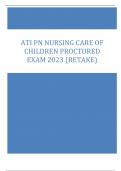
-
ATI PN Nursing Care Of Children Proctored Exam 2023 (Retake)
- Exam (elaborations) • 14 pages • 2023
-
- $15.49
- 5x sold
- + learn more
ATI PN Nursing Care Of Children Proctored Exam 2023 (Retake) Light reflects symmetrically within each pupil during a corneal light reflex test 34. A nurse is preparing an educational program about death and dying for the guardians of children who have a terminal illness. Which of the following information should the nurse include? Preschoolers believe their illness is punishment for their misbehavior. Preschoolers are interested in what h...
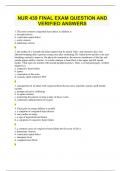
-
NUR 439 FINAL EXAM QUESTION AND VERIFIED ANSWERS 1. The most common congenital heart defect in children is a. tricuspid atresia b. ventricular septal defect c. aortic stenosis d. pulmonary atresia b 2. the mother of a 4 month old infant reports that he tu
- Exam (elaborations) • 46 pages • 2024
-
Available in package deal
-
- $11.00
- + learn more
NUR 439 FINAL EXAM QUESTION AND VERIFIED ANSWERS 1. The most common congenital heart defect in children is a. tricuspid atresia b. ventricular septal defect c. aortic stenosis d. pulmonary atresia b 2. the mother of a 4 month old infant reports that he turned "blue" and seemed to have fast labored breathing after vigorous crying soon after awakening. He settled down and his color and breathing seemed to improve. On physical examination, the mucous membranes of the lips and mouth appear mildl...
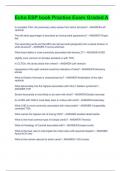
-
Echo ESP book Practice Exam Graded A
- Exam (elaborations) • 45 pages • 2023
- Available in package deal
-
- $15.49
- 1x sold
- + learn more
In complete TGA, the pulmonary artery arises from which structure? - ANSWER-Left ventricle The left atrial appendage is described as having what appearance? - ANSWER-Finger-like The ascending aorta and the MPA are derived embryologically from a spiral division of what structure? - ANSWER-Truncus arteriosis What heart defect is most commonly associated with trisomy 21? - ANSWER-AVSD slightly more common in females (isolated or with TOF) In CCTGA, the aorta arises from where? - ANS...

Do you wonder why so many students wear nice clothes, have money to spare and enjoy tons of free time? Well, they sell on Stuvia! Imagine your study notes being downloaded a dozen times for $15 each. Every. Single. Day. Discover all about earning on Stuvia


